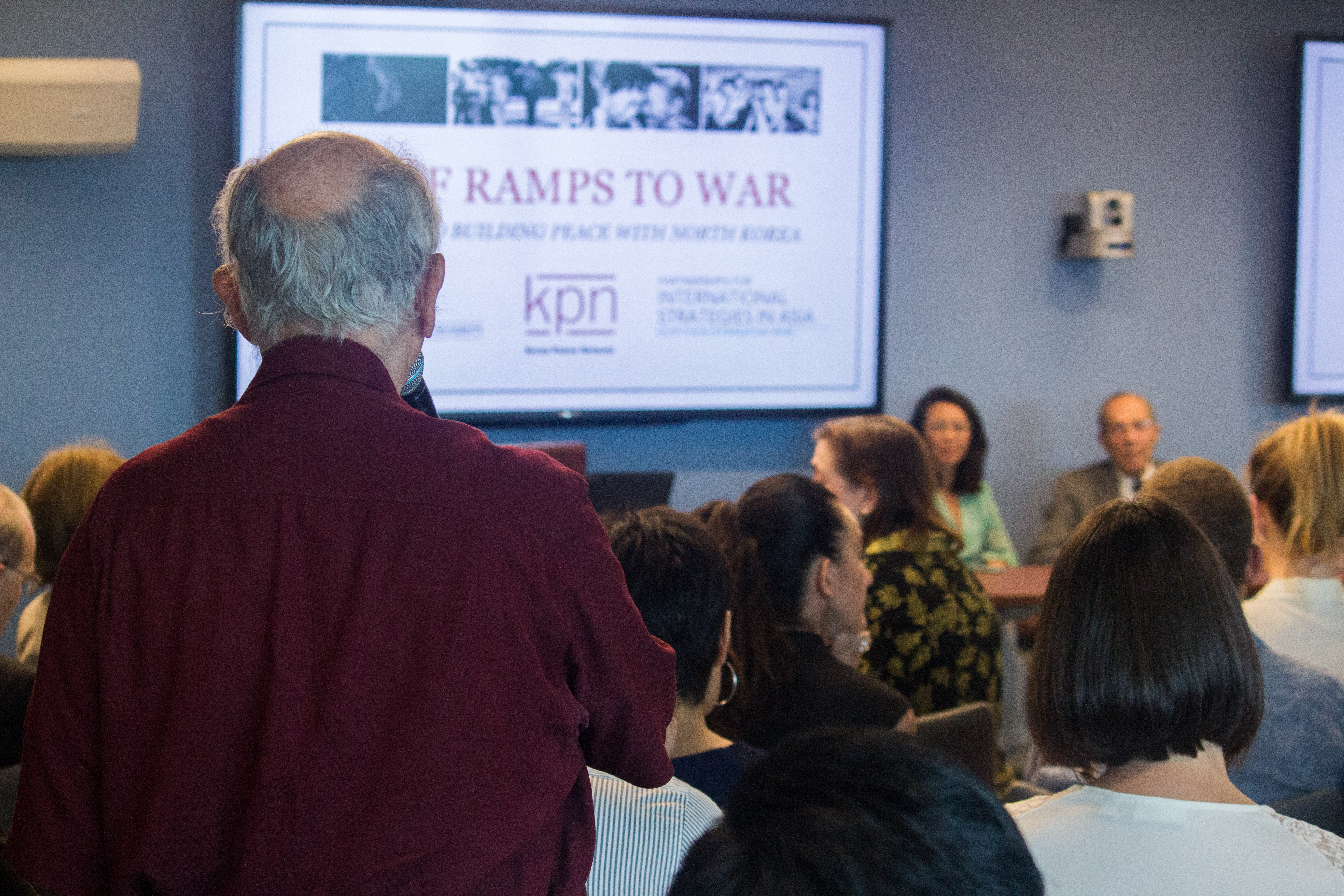
Asking questions at Off-Ramps to War: Paths to Building Peace with North Korea, an event co-sponsored by the Korea Peace Network, June 13, 2017 Carl Roose / AFSC
Most of us know very little about North Korea. In a recent experiment reported on by the The New York Times, only about 36 percent of people could locate North Korea on a map of Asia. When the public has such limited knowledge about a subject, the news media’s coverage of it shapes public opinion significantly. If you are interested in seeing a more peaceful relationship between the United States and North Korea, that’s a problem.
That’s because the media isn’t providing a full picture. We have been tracking U.S. media coverage of North Korea. In over one thousand news items over the course of 2016, one frame dominated coverage: Over three quarters of news stories framed North Korea as a threat. Only two percent of news stories were framed proactively and recognized the need for engagement with North Korea. When we see the same alarming, and at times even cartoonish, story repeated over and over again in the news, we are missing crucial context–and it can begin to feel like positive change is not possible.
AFSC has been working in Korea for the past 65 years, and we believe that positive change is possible–if policymakers and the public support peaceful engagement. To build support for engagement, we need more accurate, less alarmist coverage of North Korea. So when you hear about North Korea in the news, here are three questions to ask.
Question #1: Why is the media focusing on fear?
Reporting on North Korea is challenging, and it can be hard for reporters to get accurate, timely information about the country and its people. As a result, the media tends to rely on orientalist stereotypes about North Korea, and to write off the whole country as “crazy.” The media has a bias toward the negative, and fear is a powerful messaging tool. These stories generate more clicks and get more attention than stories about ordinary people in North Korea leading ordinary lives. But by focusing on North Korea as a threat, the media helps build support for militarized and punitive policies like sanctions, and undermines support for appropriate humanitarian aid and diplomatic engagement.
Question #2: What am I missing?
Cartoonish stories about North Korea dominate news coverage, while the lives and humanitarian concerns of North Korean people go unseen. To fill in the gaps, check out the Instagram account @EverydayDPRK, and read the about the history of North Korea. The historian Bruce Cumings has shown that the United States has played a significant role in undermining peace on the Korean peninsula for more than half a century, from drawing the dividing line between north and south in 1945, to carpet bombing that used napalm during the Korean War, to introducing nuclear weapons there in 1958. The U.S. continues to station troops in Korea, a situation that has now persisted for more than 70 years.
There are small signs that engagement is possible, but these stories are underreported in the United States. In May 2017, for example, a U.N. Human Rights Council appointee made the first visit to North Korea, and in April this year the DPRK established a parliamentary foreign affairs commission, perhaps signaling preparation for serious diplomacy. Neither story received much press attention in the U.S.
Question #3: What can I do to support a more peaceful relationship between the U.S. and North Korea?
Despite the prevalent "threat narrative" throughout 2016, a poll conducted at the end of the year by the Chicago Council on Global Affairs found that 81 percent of Americans believed that the U.S. should pursue diplomacy with the DPRK to suspend its nuclear programs. That's good news, because AFSC supports engagement with North Korea as the key to building peace there. AFSC believes that key steps include:
- Facilitating people-to-people exchanges;
- Reuniting Korean and Korean-American families;
- Repatriating the remains of U.S. servicemen left in the DPRK after the Korean War; and
- Supporting humanitarian aid projects designed to meet basic needs for North Korea.
To help build peace, read and share our new report on engaging North Korea.
And please take action! Contact the administration and tell them that humanitarian assistance to North Korea helps those in need and keeps channels of international engagement and dialogue open.